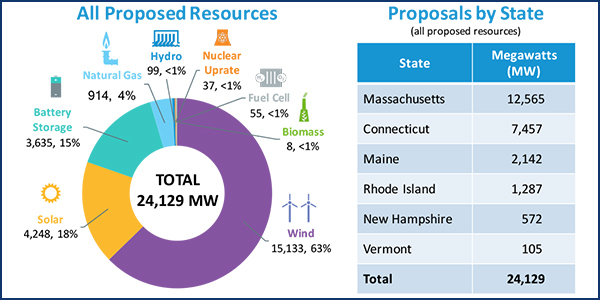Energy officials in New England are concerned that ISO-NE’s transmission planning process cannot adapt to the evolving resource mix, the growing investments in clean energy and the decarbonization of the grid. Without more robust transmission planning, they said, ratepayers in the region likely face higher costs and lower reliability, plus potential curtailment of the renewable resources needed to meet state policy goals and mandates.
Here is some of what we heard during a public online technical forum on Feb. 2, organized by New England states, to discuss reforms to the RTO’s transmission planning process.
Long-term Tx Planning ‘Key’
New Hampshire Public Utility Commissioner Kate Bailey said the region’s clean-energy transition requires “significant new investments” in renewable resources that are unlikely located close to load centers.
Bailey said changes resulting from an expansion of distributed energy resources, energy efficiency, electrification of the transportation and heating sectors and, “retirement of a good portion of the fossil-fired fleet” would likely produce “very different power flows across the grid of the future compared to today’s grid.”
“Two-way flows of power are likely to be much more common than they are today, which will make the transition even more complicated,” Bailey said. “All of this will require substantial additional spending on new transmission lines and upgrades to existing lines to accommodate the new, remotely located clean resources.”
According to Bailey, the region must complete the transition within a relatively short time, and “our goal should be to accomplish the transition at least cost for ratepayers.”
New England states have decarbonization targets of 30 to 45% by 2030 and 80% or net-zero by 2050.
Bailey said that “long-term transmission planning, which factors in the state’s collective requirements, is key.” One way to limit higher costs for ratepayers, she said, is to require competitive solicitation for all transmission construction, not just those projects that address reliability, and she hopes that “changes made to the process will require that.”
Judy Chang, undersecretary of energy for the Massachusetts Executive Office of Energy and Environmental Affairs, said the region could not afford to continue the traditional way of developing transmission by reacting to interconnection requests or conducting reliability upgrades.
ISO-NE, Eversource Weigh in
Robert Ethier, ISO-NE’s vice president of system planning, said the grid is “undergoing as big a change as it’s experienced in the last several decades.”
Ethier said the RTO’s transmission planning process has been driven by addressing reliability needs and the interconnection of new resources. The integration of renewables and storage to meet state public policy initiatives “in a timely and efficient way” will require new planning, approval and funding approaches, he said, along with greater engagement with both states and NEPOOL stakeholders.
Bill Quinlan, president of transmission for Eversource Energy, said that an effective long-term transmission planning process is essential — especially when examining the timeline to execute major upgrades — to achieve decarbonization goals.
“It’s clear to us that to deliver the clean energy future that we’re all seeking … we need to take a hard look at the long-term planning process,” Quinlan said. And “that planning process needs to begin now. We need to then look for alignment with key policies, whether it’s at the federal level … or the state level. With good involvement by the stakeholders, I think we will be able to deliver that grid of the future that will enable the clean energy future we are all seeking.”
‘The Benefit of Consumers’
Rebecca Tepper, chief of the Energy and Telecommunications Division in the Massachusetts Attorney General’s Office, said she “wanted to remind everyone” that the transmission system “was built for the benefit of consumers, and every penny of it was paid for by consumers, either directly or indirectly.”
“Over the last 10 years, New England ratepayers have spent $11 billion to develop and upgrade our transmission system,” Tepper said.
There are planned transmission upgrades “that will cost billions more,” so she said it is vital that the region makes “the best use of the transmission systems that customers have already paid for.”
“Right now, the overall utilization of our transmission system is actually low,” Tepper said. “Think about your car … you probably only use 10% capacity of your car, but it’s still really valuable when you want to drive it somewhere. …
“More efficient use of transmission lines can help save money by avoiding congestion, but it also can help integrate new kinds of uses like electric vehicles at lower costs,” she said.
Next Steps
Chang requested written comments on the forum’s topics and discussions. Those comments will be accepted through March 1 and posted publicly on the New England Energy Vision website. Additionally, she said the states would issue a joint summary of the issues identified and explain the potential solutions.
State officials have scheduled additional technical forums on governance reform (Feb. 25) and environmental justice (TBD).




